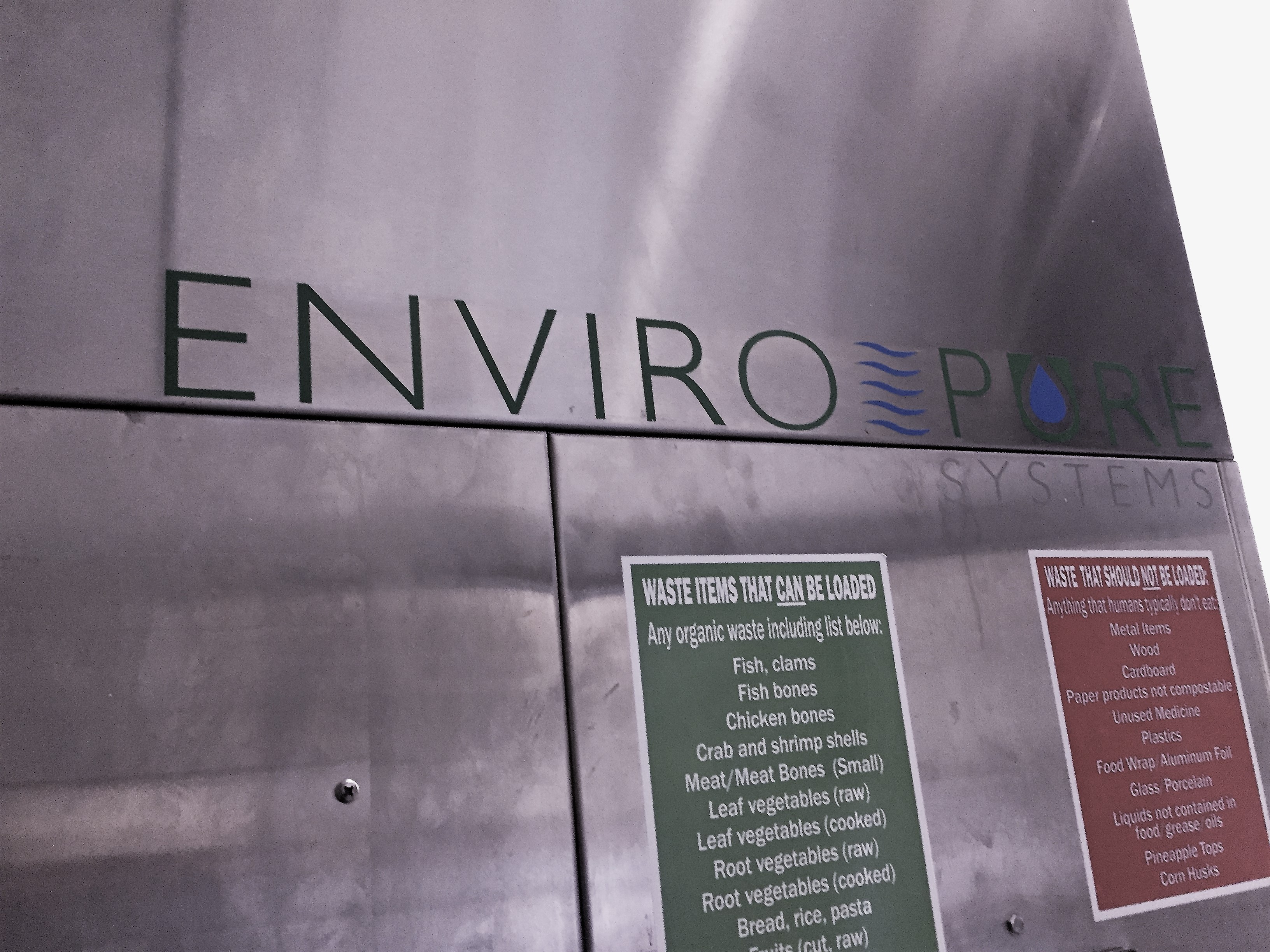As part of the renovation project of Douglass Dining Center which reopened last fall, University of Rochester Dining Services introduced a biodigester as a new way to divert food waste from the landfill. In addition to the University’s program to collect food waste for an off-site compost program, the biodigester offers a hyper-accelerated, on-site food waste elimination system. The Enviro Pure Systems biodigester takes organic pre-consumer and post-consumer food waste and converts it into water. The technology uses a combination of mechanical processing, heat, oxygen and all-natural additives to accelerate the natural aerobic decomposition process. Food waste is converted into gray water that can be safely disposed of using existing municipal wastewater systems. The biodigester can handle many types of food waste including vegetables, fruits, meat, fish and poultry, dairy products, bones, shells, pits, and compostable food-ware.
Food waste is broken down in the biodigester using a solution called Biomix. Biomix is a combination of liquid micronutrients, natural ingredients, plant extracts, and water based liquids, all of which are non-toxic and completely biodegradable. The Biomix solution provides organic decomposition enhancement and suppresses the odor of the food waste.
While the biodigester offers new technology, food waste collection is not a new initiative at the University. Since 2011, pre-consumer food waste (i.e. kitchen scraps) have been collected in all University of Rochester dining locations. In Danforth Dining Center post-consumer food waste (i.e. plate scraps) is also collected, where food waste is captured off the dish line and processed in a pulper. Waste Management picks up the material and transports it to their local compost operation. In 2016, 160.84 tons of food waste was collected and diverted from landfills via this collection systems.
Composting allows for controlled biological decomposition of organic material, which results in a product which is beneficial to plant growth. Compost can be used for landscaping, gardening, turf management, erosion control, and agriculture. In fact, University Horticulture and Grounds is using 20 yards of the finished compost product in its spring plantings on campus! Compost helps build healthier soil and plants by increasing the water capacity of soil, reducing water needs, improving soil structure, creating a healthier root environment, supplying vital nutrients, improving the soil’s ability to hold nutrients, and increasing organic matter in soil. The video below describes the process of the University’s compost program with the end product being used on campus.
Since the renovation project, post-consumer food waste is now also collected in Douglass Dining Center. The biodigester is used to divert food waste from landfills, reducing harmful methane emissions. It also reduces odors, vermin, and groundwater contamination at landfills. Because the biodigester eliminates food waste on-site, it reduces fossil fuel and carbon dioxide emissions from transporting food waste. The biodigester also reduces costs of janitorial labor, maintenance, and supplies.
Along with the biodigester and composting program, University of Rochester Dining Services also partners with The Food Recovery Network to minimize food waste. The Food Recovery Network is a national organization that unites college campuses and students from across the country with the goal of eliminating excess food waste while attempting to alleviate hunger in our local community. As part of the Food Recovery Network’s national efforts, UR Food Recovery Network is a student run organization that works to help fight hunger in the Rochester community. In 2016, 2,058 pounds of edible food was collected through this program. The group collects weekly inventories of food from various food locations on the University of Rochester’s campus and then donates food to their partner organization, St. Peter’s Kitchen.
Written by Alyssa Lemire, Class of 2017


Great Article!!!!
Find your article useful and valuable. As we also manufacture organic waste to water machines. Our automated machine transforms your organic wet waste into water in 20 hrs.
Thank you for sharing such a valuable information, even in my country a lot of food is getting wasted every day. Thank you for sharing such a nice method I will be putting this among my friends to discuss it. I will sharing it on facebook.